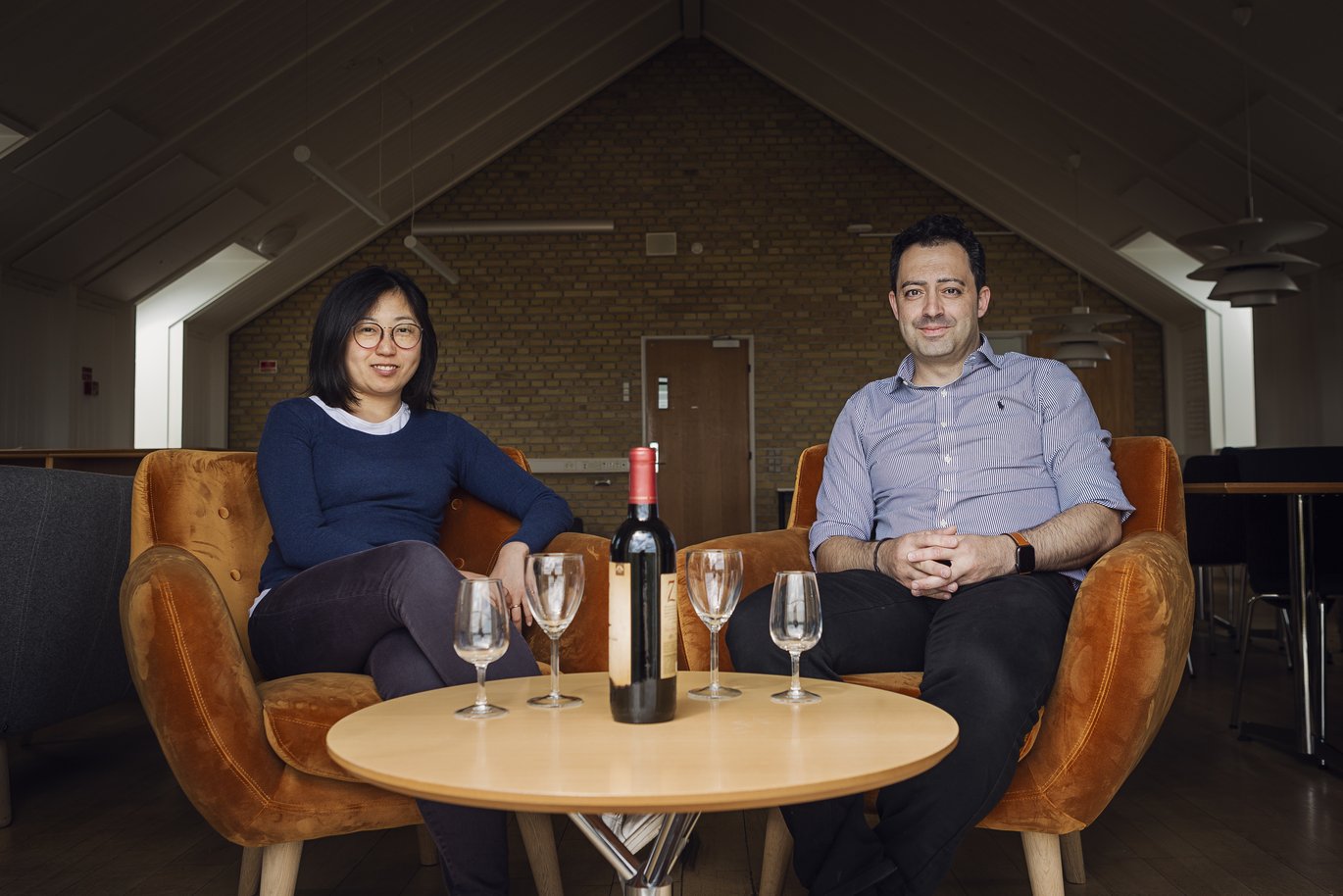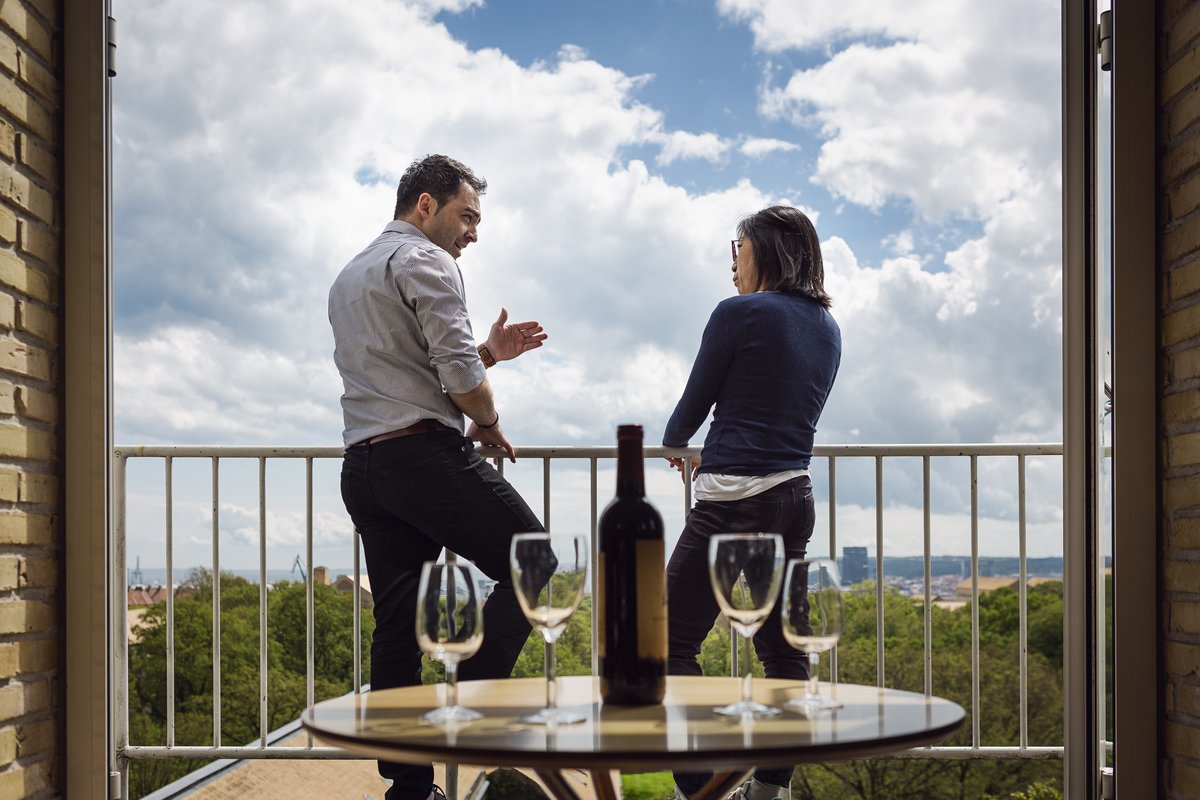Two AU researchers are Danish champions in wine tasting: “Blind tasting is an intellectual challenge”
The two AU researchers Janice Wang and Ali Amidi have just won the Danish national wine-tasting championship and are on their way to the world championship. Both of them feel that their research expertise within psychology and food science is a big advantage, and they are collaborating on a new research project about how we store flavors in our memories.

They trained intensely for months in preparation for the competition and both have years of experience as blind tasters. Janice Wang was formerly a researcher at Oxford University, where she participated in 60-70 blind tastings a year, and is currently working towards an international Master of Wine certification. Ali Amidi has been an enthusiastic blind taster for over a decade. But this was the first time they had ever competed in the Danish blind tasting championship.
Although neither of the two oenophiles lacks self-confidence, both of them were a bit surprised by their victory.
“After we had tasted the first twelve wines in the competition, we leaned back in our chairs and thought: This was it. We had a feeling that we’d done well, but not that we would make it to the finals. So when our names were called out, we were really surprised,” Ali Amidi told me.
In the finals, they competed against two other teams, tasting three more wines. Which they did so convincingly that they placed first overall, which qualified them to the world championships in blind tasting in October.
A research background is an advantage
Both agree that their background in research is a huge advantage. Janice Wang is an associate professor at the Department of Food Science, where she works on taste and the experience of taste in different contexts; wine is one of her areas of expertise. Ali Amidi is an associate professor at the Department of Psychology and Behavioural Sciences, where his research interests include the relationship between cognition, sleep and disease.
“Blind tasting is an intellectual challenge – it’s about having an eye for detail,” Janice Wong explained.
“Having an analytical approach is definitely an advantage,” she added.

Ali Amidi added:
“Yes, it’s not like you taste the wine and can tell that it’s precisely this grape from this district after a couple of seconds. It’s a deductive process, where you might start by noting that the flavor has notes of fruit, acid, tannin and alcohol, and in that way narrow down the grape, country and region.”
Because blind tasting takes place in teams, group dynamics and communication skills play a major role, and both researchers said that they found their knowledge of psychology a huge advantage.
“That’s actually one of the things we practiced most before the Danish championship. There are three of us on the team, and if two of us agree about a particular grape, it’s easy to go with that conclusion. But we practice in keeping our minds open and focussing on the argumentation for why we think it’s a particular grape,” Ali Amidi said.
The third member of the team is Janice Wang’s husband Domen Presern.
Intense training after hours
Tasting tons of different wines was – naturally – another part of their training. At both the national and world championships, participants can be presented with wines from all over the world. So they need to be able to taste all the different grapes –and how growing conditions affect their taste.
They did some of their training after work in the teacher’s lounge on the top floor of the Department of Psychology and Behavioural Sciences building.
“We got other people to buy wine for us and serve them to us – so we had no knowledge at all of what grapes we’d be encountering,” Ali Amidi said.
All this wine-swilling didn’t go unnoticed by their colleagues.
“We laughed a bit about how our colleagues always see us drinking wine together – they must think we’re alcoholics,” they said. Janice Wang added:
“But I actually can’t tolerate wine. At least not more than one glass. So it’s just the taste and not the effects that interests me.”
Would you like to be a test subject?
Janice Wang and Ali Amidi are currently recruiting test subjects for a joint research project. They need 165 subjects, each of whom will be presented with five different wines – the total quantity each subject will be given is equivalent to a single glass of wine.
To be eligible to participate, you need to be:
- Between 18 and 50 years old and in good health
- Have a normal sense of taste, smell and vision (it’s ok if you wear glasses/contacts).
For Ali Amidi, his primary fascination with blind tasting is about exploring taste at a more detailed level.
“My partner once bought me a bottle of wine for me to blind taste. And I immediately started tasting it and tuning in to what grape it might be. And she asked: Do you like it? And I actually couldn’t answer – I hadn’t considered that aspect at all,” he laughed.
The links between taste and memory
In addition to preparing for the Danish championship, Janice Wang and Ali Amidi are also getting ready to launch a joint research project on blind tasting.
“This is a project that we’ve been preparing for two years, but we had to postpone it because of Covid. But now we can finally get started and are going to do some experiments this summer,” Janice Wang told me. She has written several research papers about blind wine tasting.
In the project, they will study the links between taste and memory, and how people remember the flavors of different wines.
Translated by Lenore Messick


